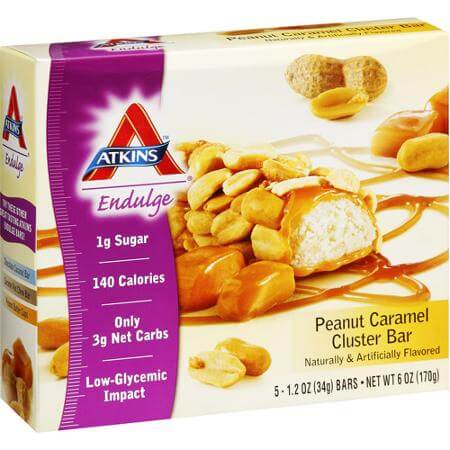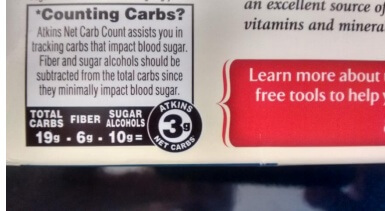Class Action Argues Atkins’ ‘Net Carbs’ Claims Are Misleading
A proposed class action lawsuit alleges claims made by Atkins Nutritionals, Inc. about “net carbs” in some of its foods are deceptive and may mislead consumers about the products’ impact on blood sugar levels. The lawsuit, filed in New York, alleges Atkins has violated consumer protection laws in all 50 states, as well as the District of Columbia.
Tell Me More...
The 43-page complaint says Atkins positions its net carb claims to communicate to consumers that the dietary fiber and “sugar alcohols”—described as synthetic substances that combine the chemical properties of sugar and alcohol— in its foods “should not be counted as carbohydrates” because of their “minimal” or “negligible” effect on blood sugar levels. These claims are prominently displayed on the products’ labels.


How Atkins calculates net carbs
The lawsuit, citing information pulled from the defendant’s website, details the following "simple calculation" - based on information on a product’s nutrition facts panel - that Atkins uses to tally net carbs for any whole food item:
Total Carbohydrates – (Minus) Dietary Fiber = (Equals) Net Carbs
For low carb products sweetened with sugar alcohols (i.e. glycerin, maltitol, etc), refer to the nutrition facts panel of the product:
Total Carbohydrates – (Minus) Dietary Fiber – (Minus) Sugar Alcohol = Net Carbs
Atkins’ website goes on to note that dietary fiber reportedly does not impact blood sugar levels, while sugar alcohols also have a negligible effect on blood sugar.
But . . .
Atkins’ net carb claims are deceptive and unlawful, the lawsuit argues, because two of its most frequently used sugar alcohols—maltitol and maltitol syrup—can, in fact, “have a significant effect on blood sugar levels.” Atkins essentially miscalculates net carbs based on its own theory, as the lawsuit alleges carbohydrates derived from maltitol and maltitol syrup should not be subtracted from “total carbohydrates” when tallying a product’s net carbs count.
At particular issue in the complaint are Atkins’ product labeling practices, with which the company essentially disregards the “indisputable scientific truth” of the effect of maltitol- and maltitol syrup-derived carbs on a consumer’s blood sugar. The lawsuit goes so far as to compare the glycemic effect of these components as that of regular table sugar.
“Real science does not require special, proprietary methods to prove its claims,” the lawsuit reads. “Atkins science is mere pseudo-science, an alternative science that ignores indisputable facts about the glycemic index of maltitol and maltitol syrup in order to promote the alternative glycemic reality communicated by Atkins labels.”
Here, it’s crucial to note the plaintiff’s lawsuit does not claim Atkins’ general carb-conscious philosophy is deceptive, nor does it allege that all of the company’s “net carbs” claims are inherently false. The complaint takes care to clarify that the plaintiff claims Atkins’ calculations for only a select group of products for which the company allegedly ignores proof that certain alcohols can raise blood sugar levels.
Which specific Atkins products does the lawsuit mention?
The complaint names the following products:
Atkins Meal Bars
- Chocolate Chip Cookie Dough Bar
- Chocolate peanut Butter Bar
- Chocolate Peanut Butter Pretzel Bar
- Cookies n’ Crème Bar
- Mudslide Bar
- Peanut Butter Granola Bar
Atkins Snack Bars
- Classic Trail Mix
- Sweet & Salty Trail Mix
- Caramel Chocolate Nut Roll
- Caramel Chocolate Peanut Nougat Bar
- Caramel Double Chocolate Crunch Bar
- Cashew Trail Mix Bar
- Coconut Almond Delight Bar
- Dark Chocolate Almond Coconut Crunch Bar
- Dark Chocolate Decadence Bar
- Triple Chocolate Bar
- Chocolate Chip Crisp Bar
- Chocolate Hazelnut Bar
- Chocolate Oatmeal Fiber Bar
Atkins Endulge Treats
- Dark Chocolate Raspberry Squares
- Dark Chocolate Fudge Squares
- Caramel Nut Chew Bar
- Chocolate Candies
- Chocolate Caramel Mousse Bar
- Chocolate Coconut Bar
- Chocolate Covered Almonds
- Chocolate Peanut Candies
- Milk Chocolate Caramel Squares
- Nutty Fudge Brownie
- Pecan Caramel Clusters
- Peanut Butter Cups
- Peanut Caramel Cluster Bar
By marketing the above as being net carb-friendly, Atkins misled proposed class members about the products’ glycemic effects while “reaping enormous profits” from consumers’ strong preference for foods with minimal carbs, the lawsuit alleges.
Who’s covered by the suit and how can I join?
The lawsuit proposes to cover a class of consumers nationwide who bought any of the products listed above during a yet-to-be-finalized time period. The case also hopes to cover a New York-specific class of consumers who purchased any of the above products in the state.
If you think you fit any of the above criteria to be a part of the lawsuit, all you have to do is sit tight. In general, nothing needs to be done to join a class action lawsuit. We’ll provide more information as it comes in.
The full complaint can be read below.
Video Game Addiction Lawsuits
If your child suffers from video game addiction — including Fortnite addiction or Roblox addiction — you may be able to take legal action. Gamers 18 to 22 may also qualify.
Learn more:Video Game Addiction Lawsuit
Depo-Provera Lawsuits
Anyone who received Depo-Provera or Depo-Provera SubQ injections and has been diagnosed with meningioma, a type of brain tumor, may be able to take legal action.
Read more: Depo-Provera Lawsuit
How Do I Join a Class Action Lawsuit?
Did you know there's usually nothing you need to do to join, sign up for, or add your name to new class action lawsuits when they're initially filed?
Read more here: How Do I Join a Class Action Lawsuit?
Stay Current
Sign Up For
Our Newsletter
New cases and investigations, settlement deadlines, and news straight to your inbox.
Before commenting, please review our comment policy.